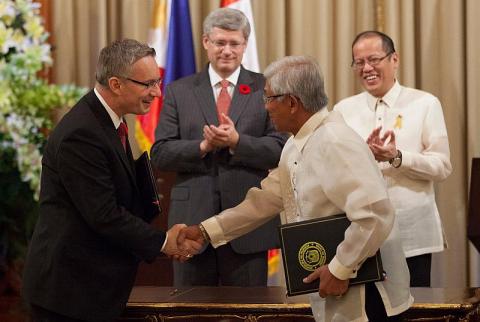JBANC PRESS RELEASE:For Immediate Release contact: Simonas Girdzijauskas
April 3, 2003 tel. 301-340-1954
JBANC Testifies in Congress on Foreign Operations Budget Items
Including Funding to Baltics
Washington DC (JBANC) - Karl Altau, Managing Director of the Joint Baltic American National Committee, Inc. (JBANC) appeared on April 2 as a witness before the Subcommittee on Foreign Operations of the House Appropriations Committee. He spoke on the behalf of the Central and East European Coalition (CEEC) for that organization’s support of “active U.S. engagement” in Central and Eastern Europe. The CEEC is an umbrella organization of 18 nationwide ethnic organizations, including JBANC, uniting more than 22 million voting Americans.
The hearing, held in the Capitol, is part of House debate on the FY 2004 Budget dealing with International Assistance programs. Foreign Operations Subcommittee Chairman Jim Kolbe (R-AZ), a member of the House Baltic Caucus, led the meeting. Other members participating were Ranking Member Nita Lowey (D-NY) and subcommittee member Mark Kirk (R-IL).
Military funding to countries designated by the United States as eligible for NATO enlargement assistance, including Estonia, Latvia and Lithuania, receive support through Foreign Military Financing (FMF) and International Military Education and Training (IMET) programs. Funding levels to the Baltics have remained steady over the past few years. Altau emphasized in his testimony that these programs “have enabled countries in the region to strengthen their role as U.S. allies and to increase their contribution to the stability and security of the Trans-Atlantic community.” Fiscal Year 2004 levels requested for the three Baltics total $19.5 million. IMET figures in the FY04 Administration request total $3.6 million for all three Baltic countries, up from $3.3 million last year.
Radical declines in U.S. assistance levels are proposed under the Freedom Support Act, affecting Ukraine, Georgia and Armenia, and Support for Eastern European Democracy (SEED) programs. This year’s budget proposal sees the elimination of funding for regional SEED programs in the Baltics. Estonia, Latvia and Lithuania graduated from SEED on a country-by-country basis prior to 2000.
Altau further stated that “U.S. assistance programs make a difference in a region that suffered many decades of communist misrule, political repression, and the negative effects of highly centralized command economics.”
A delay in the impending elimination of Voice of America and Radio Free Europe/Radio Liberty services to the Baltics and the region was requested in the testimony. Altau stated that “it is vital, especially today, that America’s voice be heard and heard clearly. The great support for the U.S. in the countries of Central and Eastern Europe has recently been affirmed.” The “untimely exit” of the radio broadcasts, said Altau, would leave “a void, in which the image of the United States abroad could be undermined.”
Following the hearings, the Committee will soon meet to begin to act on legislation The new fiscal year begins October 1.
The Joint Baltic American National Committee, Inc. represents the Estonian American National Council, Inc., the American Latvian Association, Inc. and the Lithuanian American Council, Inc.
###
Statement of Karl Altau
Managing Director
Joint Baltic American National Committee
for the Central and East European Coalition
Subcommittee on Foreign Operations Committee on Appropriations
U.S. House of Representatives
April 2, 2003
CENTRAL AND EAST EUROPEAN COALITION (CEEC)
1612 K Street, NW - Suite 410 * Washington, DC 20006 * (202) 296-6955
MEMBER ORGANIZATIONS
American Latvian Association in the U.S.
Armenian Assembly of America
Belarusian Congress Committee of America
Bulgarian Institute for Research and Analysis
Congress of Romanian Americans, Inc.
Czechoslovak National Council of America
Estonian American National Council, Inc.
The Georgian Association in the USA, Inc.
Hungarian American Coalition
Joint Baltic American National Committee, Inc.
Lithuanian American Council, Inc.
Lithuanian American Community, Inc.
National Federation of American Hungarians
Polish American Congress
Slovak League of America
Ukrainian Congress Committee of America, Inc.
Ukrainian National Association, Inc.
U.S. Baltic Foundation
Mr. Chairman, Honorable Members of the Subcommittee, I am pleased to be with you today on behalf of the Central and East European Coalition (CEEC) to discuss the importance of U.S. assistance programs to Central and Eastern Europe.
The Central and East European Coalition comprises 18 national membership organizations representing more than 22 million Americans who trace their heritage to that part of the world. The Coalition strongly believes that the long-term national security and budgetary interests of the United States demand an unwavering commitment to the transition of Central and East European countries to fully democratic, free market nations. This commitment requires continued active U.S. engagement in that part of the world..
Mr. Chairman, I want to use this opportunity to state for the record that we stand firmly in support of our American troops in Iraq and Afghanistan. We hope and pray for their safety and speedy return home.
Before continuing, allow me to underline the key point that I would like you to consider while the Committee moves through the FY 2004 appropriations process. Foreign assistance programs are serving U.S. strategic and practical interests, from the war on terrorism to fighting corruption and public health threats. When we cut these dollars we are short-changing American interests.
We were pleased that the Fiscal Year 2003 Appropriations bill continued U.S. support for the countries of Central and East Europe, despite the overall reduction in funding. Funding to these countries, especially the critical earmarks, has meant a tangible and permanent contribution to reforms taking place in countries like Armenia, Georgia and Ukraine. Nevertheless, we are greatly alarmed by the trend of radical reductions in assistance to the countries of Central and East Europe of over the past several years.
The Central and East European Coalition believes that peace, stability and democracy throughout Europe serve the national security interests of the United States. During the past century, the U.S. was called upon to fight two world wars and a long Cold War to protect and defend those political objectives. The institutionalization of democracy and free market economies in Central and Eastern Europe has proven to be the best means of guaranteeing that, in the future, there will be no further European conflicts which will require costly intervention by the United States. We believe that following the collapse of the Soviet Union, the objectives of peace, stability and democracy are being achieved in that region. However, the continued engagement, support and assistance of the United States is required to ensure the successful completion of these goals.
With this in mind the CEEC would like to bring to the Subcommittee our specific recommendations for the FY 2004 Foreign Operations Appropriations bill.
First, the CEEC notes that general stability and security on the European continent has been enhanced through the expansion of the NATO Alliance to include Poland, Hungary and the Czech Republic. We believe that the security of the region is being further enhanced with the November 2002 invitation of seven additional countries, from the Baltic to Black Sea, to join NATO, especially if they continue to implement the military, social and political reforms necessary to strengthen their democratic institutions and the rule of law. We applaud the Administration’s commitment and strong bipartisan support in Congress for this process. We urge the Subcommittee to maintain the level of aid appropriated for countries designated by the United States as eligible for NATO enlargement assistance.
We also want to use this opportunity to emphasize our strong position that the NATO “open door policy” should not be limited to Vilnius 10 group of NATO hopeful countries. The success story of the Baltics, for instance, should serve as evidence that the open door policy of NATO should extend to all willing and qualified countries that have or will demonstrate their interest in joining the Alliance.
NATO enlargement, however, is only one part of a broad strategy to foster a peaceful, undivided and democratic Europe.
Crucial components of this process are U.S. assistance programs such as Foreign Military Financing (FMF) and International Military Education and Training (IMET). As a result of FMF and IMET, countries in the region have been able to carry out not only vital military reforms but also impressive economic and political reforms. These assistance programs have enabled Central and East European countries to strengthen their role as U.S. allies and to increase their contribution to stability and security of the Trans-Atlantic community. We ask that FMF and IMET funding for the region be maintained at the present levels.
Second, the CEEC strongly urges the Subcommittee to restore Freedom Support Act funding in the FY 2004 appropriations bill to the FY 2003 appropriated levels. Under the current budget proposal the overall FSA budget will be reduced by 25% from the FY 2003 levels, and by nearly 50% from FY 2002 levels. In particular, cuts to the FSA have severely affected Armenia, Georgia and
Ukraine. The President’s 2004 request proposes to cut funding for Armenia to $49 million down from the FY 2003 level of $90 million. This represents a 45% reduction in assistance. The budget request of $75 million for Georgia is down nearly 14% from last year’s request of $87 million. For Ukraine the Administration has requested a 40% cut in aid, to $94 million in FY 2004
down from $155 million in FY 2003. In addition to encouraging continued robust funding to theses countries the CEEC strongly supports earmarking aid to countries that have had funding appropriated. We urge the Congress to sustain earmarks in the future for development programs.
The Coalition strongly supports continued funding for Support for East European Democracy (SEED) programs. We applaud Congress for its leadership in providing SEED funding in excess of the Administration request in the FY 2003 Appropriations bill, specifically for Baltic regional programs. This funding is being administered in a cost-effective manner to address key U.S. policy priorities including fighting corruption and the spread of HIV/AIDS and tuberculosis, promoting democratic values in Belarus, and improving the climate for U.S. investment in the region. The funding is being leveraged many times over and Congressional leadership is ensuring that the Administration does not prematurely zero-out SEED assistance in the Baltics.
SEED funding levels for Bulgaria and Romania have remained consistent and we encourage Congress to continue that tendency in this year’s appropriations bill. Please note that in the Administration’s budget request for FY 2004, SEED funding for the Baltic countries is slated to be eliminated.
With the precipitous erosion in already scarce U.S. assistance programs, especially in the FSA account, we fear that U.S. interests are not being properly served. After many decades of communist misrule, political repression, and the negative effects of highly centralized command economics, the countries of Central and Eastern Europe still depend upon U.S. assistance programs as they transition into stable and independent democracies. We should not forget the financial and human costs of winning the Cold War, as well as the potential consequences if these new democracies should fail in their quest to fully transform themselves into market democracies.
Third, in order to more effectively implement foreign assistance programs passed by Congress, the Coalition looks to work on further reform and revitalization in the area, such as the projection of U.S. public diplomacy, nuclear safety and other areas that deal with the security and stability of the region.
Although not strictly under the auspices of this committee, we must state that international public diplomacy goes hand-in-hand with foreign assistance programs. International broadcasting has been an important tool in promoting U.S. interests abroad. The CEEC stands against the premature cuts and elimination of services at the Voice of America and Radio Free Europe/Radio Liberty, at least until these countries are securely in NATO and the European Union. It is vital, especially today, that America’s voice be heard and heard clearly. The great support for the U.S. in the countries of Central and Eastern Europe has recently been affirmed. We should make sure that the relationship remains actively supportive, especially as the region integrates with the Trans-Atlantic community. The untimely exit of this valuable resource of American public diplomacy could usher in a potential void for undermining the image of the United States abroad.
Safety at nuclear power plants in the region is another area in which sustained U.S. support and guidance could be effectively used as the countries of the region transition further into the West.
We hope that USAID and other government-funded entities in the U.S. continue to reach out to our organizations, ones that have historical ties and long-term commitments to the countries of Central and Eastern Europe in implementing foreign assistance programs. Region specific organizations, including many in our American ethnic communities, have high standards of professionalism, possess an intimate knowledge of the political, economic and social conditions in a given country, and have access to language capabilities others lack.
We want to conclude with the message to the Subcommittee that we support the continuing strong role for the United States in world affairs. The United States must not shy away from its responsibilities. The Coalition strongly believes that the overall international affairs account should be maintained, especially in this time of great danger in the world. The need for strong and proactive diplomacy in support of the foreign policy objectives put forth by the President and Congress is not possible without appropriate funding levels to sustain and support America’s leadership.
Mr. Chairman, an investment in democracy building will pay dividends through long-term security and reduced military expenditures for the United States. The political, economic and security assistance the United States provides is an essential element in integrating, permanently and systemically, the states of Central and Eastern Europe into the family of democratic nations committed to pluralism, free markets, and the rule of law.
The CEEC greatly appreciates your attention to these very important matters and looks forward to working with the distinguished Members of the Subcommittee in the coming months.
Thank you.
[end]
*****************************
JOINT BALTIC AMERICAN NATIONAL COMMITTEE, INC.
Representing:
Estonian American National Council, Inc.
American Latvian Association, Inc.
Lithuanian American Council, Inc.
400 Hurley Avenue
Rockville, MD 20850
Tel: (301) 340-1954
Fax: (301) 309-1406
E-Mail:
Net: http://jbanc.org
JBANC PRESS RELEASE:
Kuumad uudised | 03 Apr 2003 | EWR
Kuumad uudised
TRENDING























